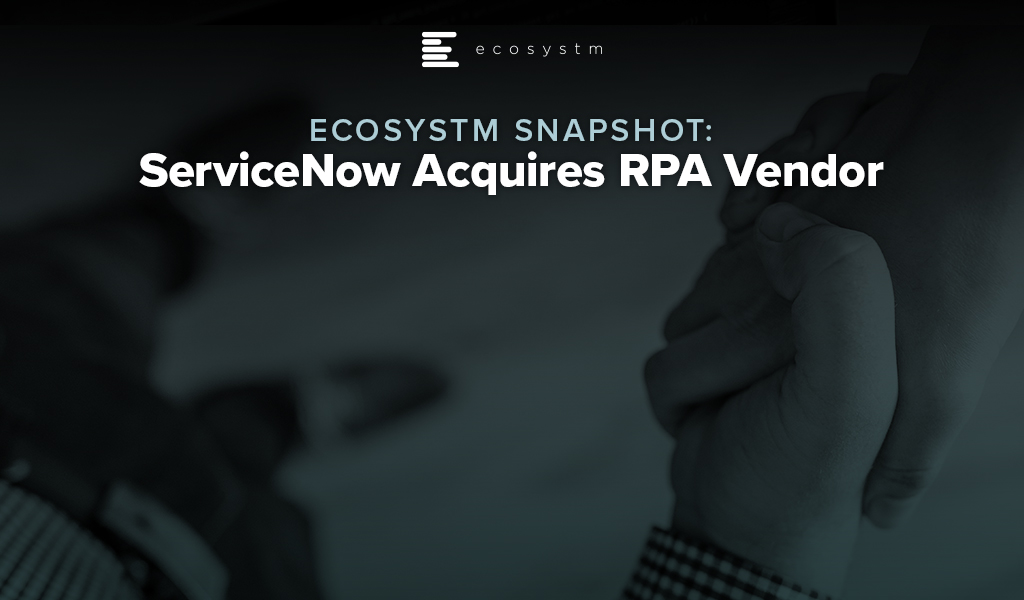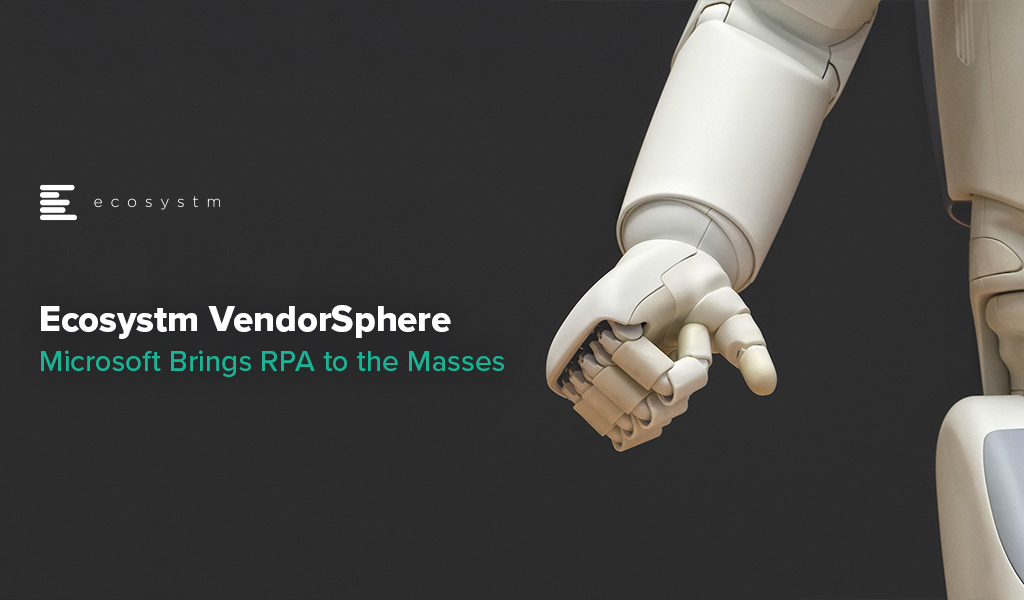ServiceNow announced their intention to acquire robotic process automation (RPA) provider, Intellibot, for an undisclosed sum. Intellibot is a significant tier 2 player in the RPA market, that is rapidly consolidating into the hands of the big three – UiPath, Automation Everywhere, and Blue Prism – and other acquisition-hungry software providers. This is unlikely to be the last RPA acquisition that we see this year with smaller players looking to either go niche or sell out while the market is hot.
Expanding AI/Automation Capabilities
Intellibot is the latest in a string of purchases by ServiceNow that reveals their intention to embed AI and machine learning into offerings. In 2020, they acquired Loom Systems, Passage AI (both January), Sweagle (June), and Element AI (November) in addition to Attivio in 2019. These acquisitions were integrated into the latest version of their Now Platform, code-named Quebec, which was launched earlier this month. As a result, Predictive AIOps and AI Search were newly added to the platform while the low-code tools were expanded upon and became Creator Workflows. This means ServiceNow now offers four primary solutions – IT Workflows, Employee Workflows, Customer Workflows, and Creator Workflows – demonstrating the importance they are placing on low-code and RPA.
ServiceNow was quick to remind the market that although they will be able to offer RPA functionality natively once Intellibot is integrated into their platform, they are still willing to work with competitors. They specifically highlighted that they would continue partnering with UiPath, Automation Anywhere, and Blue Prism, suggesting they plan to use RPA as a complementary technology to their current offerings rather than going head-to-head with the Big Three. Only a month ago, UiPath announced deeper integration with ServiceNow, by expanding automation capabilities for Test Management 2.0 and Agile Development projects.
Expansion in India
The acquisition of Intellibot, based in Hyderabad, is part of ServiceNow’s expansion strategy in India – one of their fastest growing markets. The country is already home to their largest R&D centre outside of the US and they intend to launch a couple of data centres there by March 2022. The company plans to double their local staff levels by 2024, having already tripled the number of employees there in the last two years. The expansion in India means they can increasingly offer services from there to global customers.
Market Consolidation Accelerates
In the Ecosystm Predicts: The Top 5 AI & AUTOMATION Trends for 2021, Ecosystm had talked about technology vendors adding RPA functionality either organically or through acquisitions, this year.
“Buyers will find that many of the automation capabilities that they currently purchase separately will increasingly be integrated in their enterprise applications. This will resolve integration challenges and will be more cost-effective.”
ServiceNow’s purchase is one of several recent examples of low-code vendors acquiring their way into the RPA space. Last year, Appian acquired Novayre Solutions for their Jidoka product and Microsoft snapped up Softomotive. Speculation continues to build that Salesforce could also be assessing RPA targets. Considering RPA market leader, UiPath recently announced that their Series F funding round values the company at USD 35 billion, there is pressure on acquirers to gobble up the remaining smaller players before they are all gone or become prohibitively expensive.
The cloud hyperscalers are also likely to play a growing role in the RPA market over the next year. Microsoft and IBM have already entered the market, coming from the angle of office productivity and business process management (BPM), respectively. Google announced just last week that they will work closely with Automation Anywhere to integrate RPA into their cloud offerings, such as Apigee, AppSheet, and AI Platform. More interestingly, they plan to co-develop new solutions, which might for now satisfy Google’s appetite for RPA rather than requiring an acquisition.
Here are some of the trends to watch for RPA, AI and Automation in 2021. Signup for Free to download Ecosystm’s Top 5 AI & Automation Trends Report.

This week at Microsoft Ignite, there was a heavy emphasis on RPA and low code as the tools it sees as the future of productivity. It used its annual conference for developers and IT professionals to make a slew of announcements about its Power Platform. Most notable is that from this week, Power Automate Desktop will be bundled with Microsoft Windows and is available as a free download. This marks a major step in the direction of mass adoption of RPA.
By Microsoft’s estimates, 50% of tasks carried out by information workers could be automated by currently available technology but are instead performed manually. Moreover, 500 million apps will need to be built by 2026, more than were developed in the last 40 years. Slowing down the pace of automation and the roll out of apps to enable digital business, is the skills gap, with a shortage of 1 million developers in the US alone. This is of course why Microsoft is betting on RPA and low code tools to empower citizen developers to do it themselves.
Microsoft was arguably slow to focus on RPA and low code considering its breadth of applications and good standing with developers. It only announced the general availability of UI Flows in Power Automate less than a year ago. Moreover, its automation suite worked best in the Microsoft universe but had limited interoperability with third-party tools. In May 2020, it acquired Softomotive, which signalled that it was taking RPA seriously and was willing to expand beyond the automation of its own software. By then, acquiring one of the big three – UiPath, Automation Anywhere, or Blue Prism – would have been excessively costly but Softomotive ensured it had both attended and unattended RPA capabilities to build upon. Softomotive’s WinAutomation remerged as Power Automate Desktop in September and with this week’s announcement, it becomes a native component in Windows.
By providing Power Automate Desktop for free with Windows, Microsoft appears to be attempting to generate interest from users who may not have previously been exposed to RPA. For the widespread adoption of RPA beyond just functions like finance, HR, and procurement, these tools need to be put into the hands of average users that can find their own use cases. Eventually, some of these basic users will need more advanced functionality available in the cloud-based version of Power Automate. Microsoft has a range of pricing plans including per user, per flow, with AI Builder, and unattended RPA.
Security and Governance
While making free desktop-based automation available to all, may be an effective means of raising the profile of RPA, Microsoft realises that it must provide IT and security teams with tools for control. It also announced this week additional features, such as:
- Endpoint filtering to turn on selected connections but with restrictions
- Connector action controls, e.g. allowing read permission but not write in some connectors
- Tenant isolation to provide differentiated access to connectors according to business unit
- Usage dashboards
Power Fx – Microsoft’s Low Code Language
Microsoft is one of the best-placed vendors to address the needs of citizen developers; bringing together its dominance as a productivity software provider and an important part of the developer ecosystem. This week it also introduced Power Fx, a low-code programming language based on Microsoft Excel. The logic of this new, simple language should be familiar to the millions of spreadsheet users. Power Fx provides more advanced citizen developers with a bridge from the drag-and-drop features of the Power Platform to low-code development.
Is 2021 the year RPA finally goes mainstream?
Microsoft’s announcements this week are one of many signs in the last few months that the RPA market is on its way to gaining mainstream acceptance. Also garnering attention was the lofty valuation given to the market leader, UiPath, this year. It recently announced that in its Series F funding round, it closed at $750M, valuing the company at $35B. This is hot on the heels of confirmation that it plans to IPO, probably in the first half of 2021. Last year was also a rapid period of consolidation, with Appian, IBM, and Microsoft all making RPA acquisitions. It seems highly likely that in the next few months we could see acquisitions or RPA launches by some of the cloud and application vendors that have until now been waiting to see the technology mature.
How will RPA be a part of your automation strategy in 2021? The Top 5 AI & Automation Trends for 2021 are available for download from the Ecosystm platform. Signup for Free to download the report.




